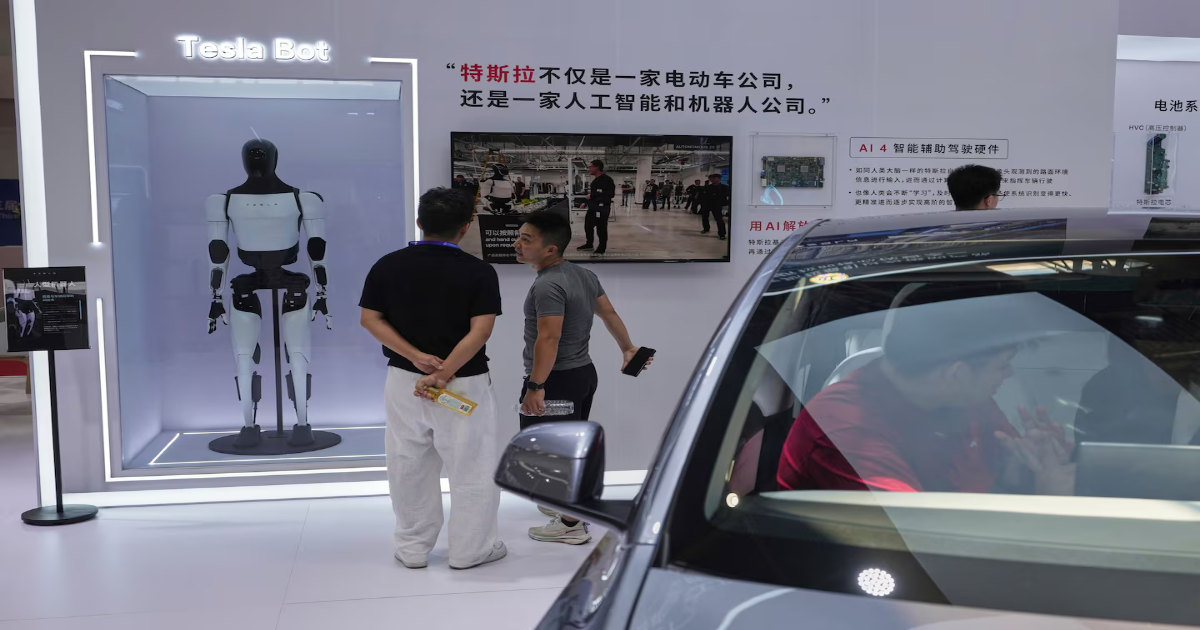Tesla’s latest earnings report released Wednesday showed an ongoing slump in profits and revenue after CEO Elon Musk’s controversial stint in politics, and the company said President Donald Trump’s recently passed tax bill is set to cause more pain.
The company attributed its protracted decline in profits to an array of factors, including falling vehicle deliveries. But a primary challenge to its business, the company said, was the tax bill passed this month that is expected to have implications beyond ending a $7,500 consumer tax credit for the purchase of a new electric vehicle.
“The One Big [Beautiful] Bill has a lot of changes that will affect our business,” Tesla chief financial officer Vaibhav Taneja said on the company’s earnings call, referring to Trump’s tax law.
He said the bill’s elimination of penalties for automakers that fail to meet certain emissions standards will cause ongoing problems for the automaker. Tesla has seen falling sales of emissions credits, a side effect of growing competition in the electric vehicle market.
Musk said on the earnings call that autonomous driving and robots would be the driving force behind Tesla’s turnaround. But neither of those generates significant revenue for the company, suggesting that investors will have to be patient.
Tesla reported $1.2 billion in profits for the second quarter, down from $1.4 billion in the same period last year.
The annual decline was less severe than the 71 percent drop the company reported in April, but it extends a sharp downward trend that began after Musk joined the Trump administration to oversee deep cuts to the federal workforce. Tesla stock fell in after-market trading.
Tesla reported this month that its global vehicle deliveries were down 13.5 percent in the second quarter of the year, to 384,122. In the first quarter, global deliveries were down 13 percent year-over-year, and profits fell 71 percent.
Tesla’s latest results showed a major drop in the sales of emissions regulation credits, which have been a linchpin of its business. The company sold $439 million of the credits in the second quarter, a steep drop from $890 million in the same period last year.
Automakers buy credits off the electric vehicle company to comply with emissions standards they are failing to meet on their own. But as other automakers have expanded their electric vehicle and hybrid programs, they need to buy fewer credits from Tesla.
Tesla’s credit sales have in some previous quarters been crucial to lift revenue higher than expenses. In the first quarter of 2025, the company sold $595 million of regulatory credits and reported profits of $409 million.
“While we never plan our business around such sales, it will nonetheless impact our total revenue,” Taneja said Wednesday, when discussing the impact of the recently passed bill.
Stephanie Brinley, an automotive analyst at S&P Global, said that the decline in regulatory credit sales had been ongoing for the past year and that the larger concern for Tesla is the decline in vehicle sales.
The new tax law, she said, “is more likely to have greater impact on future quarters.”
Tesla was showing signs in 2024 that increased competition for electric vehicles from other automakers was hampering sales. Musk’s embrace of Trump’s campaign last year and the president’s reelection prompted expectations from shareholders that Tesla could benefit from reduced regulatory scrutiny.
But after Trump took office, analysts and shareholders have said the company’s challenges were worsened by Musk’s political ventures. In his role with the U.S. DOGE Service, an acronym for Department of Government Efficiency, Musk championed sweeping and controversial federal layoffs and budget cuts.
Musk stepped back from the government in May, but shareholders are now concerned about the business consequences of the CEO’s recent falling-out with Trump. The two men sparred over the president’s recently passed tax bill, which is expected to raise the national debt by trillions and end the $7,500 tax credit for buyers of electric vehicles.
The billionaire has threatened to start a political party that could peel away some Republican voters. The entrepreneur’s fiery reengagement with politics infuriated longtime shareholders, who called on Tesla’s board to pull the CEO’s attention back to his embattled EV company.
Trump has suggested DOGE should take “a good, hard, look” at Musk’s extensive business with the government, which includes large deals with his rocket company SpaceX, a major NASA contractor.
Thomas Monteiro, senior analyst at Investing.com, said Tesla’s second-quarter numbers “spark some optimism” because they suggest “the worst is likely behind it — at least in terms of the core auto business.”
“The outlook for the core business is looking somewhat better,” Monteiro said in an email.
Tesla began rolling out its long-promised Robotaxi service last month to select riders in Austin. The company is fighting a federal wrongful death suit in Miami that alleges Tesla’s Autopilot feature contributed to a fatal 2019 crash.
Tesla is also arguing before a California judge against regulators who want to ban Tesla sales in the state, alleging that the company has falsely marketed the capabilities of its driver assistance features.
Investors have been eager for the automaker to finally launch its fully self-driving vehicle, as Musk has previously said that “the value of Tesla, overwhelmingly, is autonomy.” On Wednesday, Musk said the company would expand “autonomous ride-hailing for half of the U.S. population by year-end” pending regulatory approval.
The “Robotaxi fleet will go from tiny to gigantic in a short period of time,” he said.
Musk has a long history of exaggerating timelines for his self-driving vehicles. In 2019, he promised to have over a million robotaxis on the road by the end of 2020, “for sure.”
